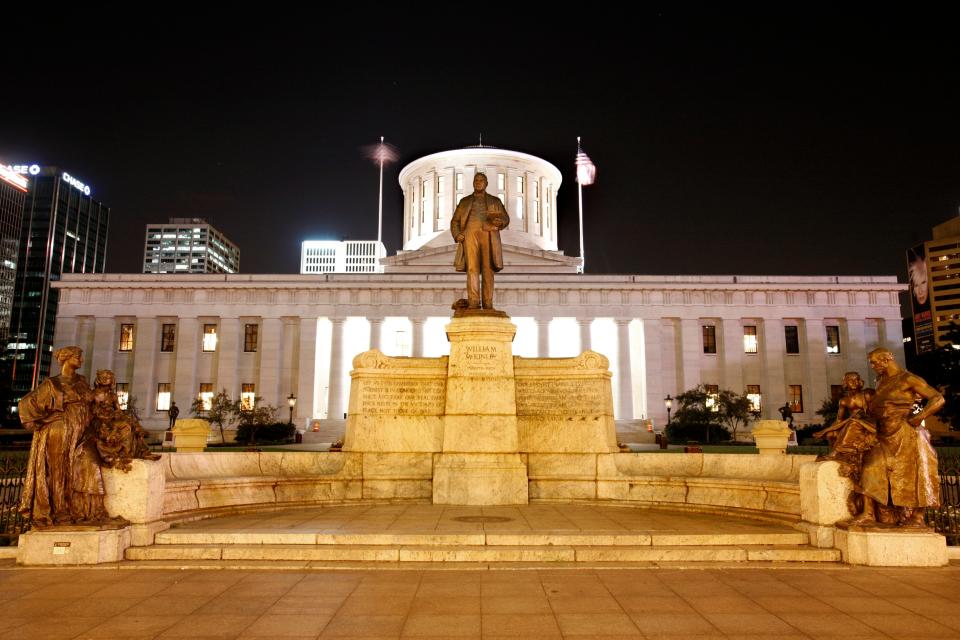Ohio has long history with strict gun regulations predating Civil War

In 2002, a Hamilton County judge sent shockwaves across Ohio when he ruled the state's ban on carrying a concealed weapon violated the state constitution.
But when the case reached the Ohio Supreme Court, justices disagreed, writing that the ban "has been part of our legal heritage since 1859." The justices noted that the Ohio Constitution had been amended by the state General Assembly "time and again without fundamental modification, that did not arouse the concern of two different constitutional conventions."
Preemption laws: Columbus, other cities battling state legislatures in efforts to control gun violence
Timeline: How Ohio gun laws have changed in last 20 years
Many Ohioans might not be aware and would be surprised to learn just how much current state gun laws have deviated from their long-entrenched and not-so-distant past, as the gerrymandered, GOP-controlled legislature has sided with gun lobbyists in recent years to dismantle the state's firearms regulations.
Ohio Constitution gives cities 'home rule' power
Now, it's cities that are pointing to the state constitution for relief, arguing that the voter-approved "home rule" provision gives them the right to create their own gun laws to fill the void. Columbus and some other cities argue in court challenges that state lawmakers overstepped their constitutional bounds in 2007 when they passed a law that "preempted" cities' power to regulate guns.
Before 1912, when Ohio voters made massive and unprecedented changes to the state constitution, cities had no rights to pass gun laws absent the consent of state lawmakers. In fact, they almost had little power to do anything, said Mike Curtin, author of "The Ohio Politics Almanac," which traces Ohio's historical political development.
Under fire: An examination of gun violence around Columbus
The change was part of the progressive political movement sweeping the nation around the turn of the 20th century, pushing for women's suffrage, the end to patronage, less influence of big money in politics, and home rule for cities, among other topics.
“The legislature micro-managed," leaving cities to "go begging," said Curtin, a former Democratic member of the Ohio House of Representatives and, before that, a one-time publisher of The Dispatch.
None of the dozens of constitutional amendments in 1912 dealt specifically with the right to bear arms. Because at that time, Ohio had some of the strongest gun regulations in the U.S., said Steven Steinglass, dean emeritus at the Cleveland State University College of Law.

“There really is a history of gun-control legislation in Ohio,” Steinglass said, noting that under the 1859 concealed-carry law, Ohioans couldn't have a concealed weapon anywhere in the state, even inside their homes.
In 1920, the state Supreme Court upheld a strict pre-Civil War concealed carry ban in a case involving a laborer whose gun was found hidden in his belongings inside his company group-housing dorm, said Richard Coglianese, Columbus' solicitor general.
“His defense was, 'This is my residence,'" Coglianese said. "Courts said: Doesn’t matter. The General Assembly has the right to pass rational protective gun laws, and this is perfectly fine under the Ohio Constitution."
After getting home rule rights under the state constitution, Ohio cities also enacted gun codes. The Ohio Supreme Court upheld Dayton's permitting law in 1974, and Cleveland's local assault weapons ban in 1993, writing that "public health and safety" is a proper (local) police power.
The ban states that it "preempts, supersedes, and declares null and void" any local gun restrictions.
“So that’s why we ended up with this," Coglianese said of current gun law in Ohio. "The gun groups kept — every time that they were trying to challenge these municipal regulations — they kept losing. So what they did is they went to the General Assembly and said 'Just prohibit municipalities from regulating firearms.'"
Preemption law prohibits cities from regulating firearms
The GOP-controlled Ohio Supreme Court has since upheld the preemption law twice.
Steinglass said delegates to the 1912 constitutional convention "did not — did not, did not — adopt a policy of preemption. … They rejected preemption. And I believe preemption is a myth, and it gets repeated all the time.
“What they did recognize is that in certain circumstances, what they call 'general laws', would conflict with local ordinances, (and) in those cases if it was a proper general law, the state would prevail," Steinglass said. "That may seem like a very thin distinction, but it isn’t, because for a law to be a general law it has to comprehensively regulate the area. And that’s the key.”
So does the Ohio General Assembly's new looser, hands-off approach to guns represent a comprehensive body of regulation strong enough to constitutionally block cities' right to make their own local ordinances?
As lawmakers continue to unwind the state's longstanding gun regulations, the argument has gotten weaker, Coglianese said. Ohio lawmakers have since legalized concealed weapons in bars, restaurants, museums and other places (while continuing to ban bringing guns into the Statehouse); did away with requiring handguns transported in vehicles to be in a holster, a locked box or in plain sight; removed a requirement motorists inform police at a traffic stop of a gun's presence; and removed a prohibition for those convicted of certain drug misdemeanors to possess guns, he said.
In addition, a "stand your ground" law has replaced a requirement that a gun owner retreat if possible from a confrontation.
In 2004, residents had to apply for a permit to conceal carry a gun. It asked four pages of questions, including if the applicant had ever been convicted of domestic violence, been committed to a mental institution, is a fugitive, the subject of a stalking restraining order, or addicted to any drugs. Lying on the form was a fourth-degree felony.
"Do NOT bring a firearm with you when applying for or picking up your license," the Carroll County Sheriff's Department instructed permit seekers on its website.
Last year, Gov. Mike DeWine signed a law that did away with the need for any permit to carry a concealed weapon, and that also eliminated the need for eight hours of training and a background check to do so.
The city of Columbus successfully argued in court that when lawmakers amended the gun-preemption law in 2018, they violated home rule. The ruling immediately set off appeals. On Aug. 15, a three-judge panel with the 10th District (Franklin County) Court of Appeals — including two Democrats — unanimously reversed the ruling of Franklin County Common Pleas Judge Stephen McIntosh, a Democrat.
The appeals judges wrote McIntosh had ruled unconstitutional parts of an amended bill that had already been ruled constitutional twice by the Ohio Supreme Court, and sent the case back to McIntosh for a do-over.
Ohio Attorney General Dave Yost declared victory: “Just like we argued in court, firearms owners statewide should have to follow the same rules.”
wbush@gannett.com
@ReporterBush
This article originally appeared on The Columbus Dispatch: Ohio gun law repealed by legislature predated Civil War

